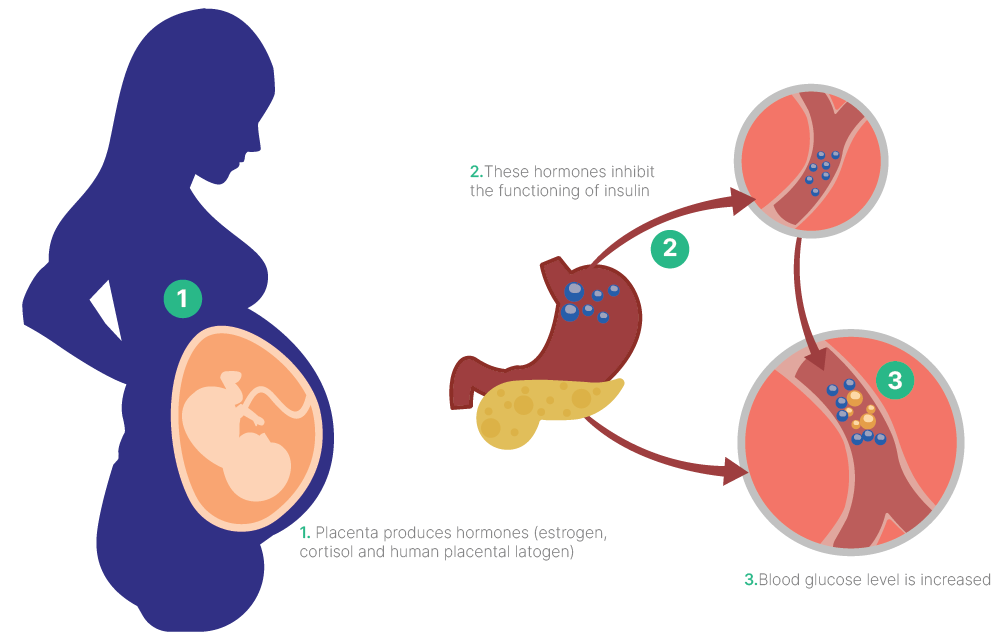how long does gestational diabetes take to go away Gestational affect risks maternal fetal
Gestational diabetes is a condition that can occur during pregnancy. It is characterized by high blood sugar levels and can have several risks and effects on both the mother and the baby. Managing gestational diabetes is crucial in order to minimize these risks and ensure a healthy outcome for both.
How gestational diabetes can affect the baby
 When a pregnant woman has gestational diabetes, it can impact the baby’s health in several ways. One of the main concerns is macrosomia, which is a condition where the baby grows larger than average. This can lead to difficulties during delivery, as well as an increased risk of injuries to both the baby and the mother.
When a pregnant woman has gestational diabetes, it can impact the baby’s health in several ways. One of the main concerns is macrosomia, which is a condition where the baby grows larger than average. This can lead to difficulties during delivery, as well as an increased risk of injuries to both the baby and the mother.
In addition, babies born to mothers with gestational diabetes may have low blood sugar levels at birth. This can cause various symptoms such as seizures, breathing difficulties, and poor feeding. These babies are also at a higher risk of developing type 2 diabetes later in life.
Furthermore, gestational diabetes can affect the baby’s lung development. It increases the production of insulin in the baby’s body, which in turn hinders the full development of the lungs. As a result, the baby may experience respiratory distress after birth.
Does gestational diabetes go away after pregnancy?
 Many women wonder if gestational diabetes goes away after pregnancy. While it is common for blood sugar levels to return to normal shortly after giving birth, it is important to note that having gestational diabetes increases the risk of developing type 2 diabetes in the future.
Many women wonder if gestational diabetes goes away after pregnancy. While it is common for blood sugar levels to return to normal shortly after giving birth, it is important to note that having gestational diabetes increases the risk of developing type 2 diabetes in the future.
Around half of the women who have had gestational diabetes go on to develop type 2 diabetes within 5 to 10 years following pregnancy. Therefore, it is crucial for women with a history of gestational diabetes to adopt a healthy lifestyle, which includes regular exercise, a balanced diet, and maintaining a healthy weight, in order to reduce the risk of developing type 2 diabetes.
Regular check-ups and screenings are also necessary to monitor blood sugar levels after pregnancy. Women who have had gestational diabetes should undergo a glucose tolerance test 6 to 12 weeks postpartum and then every 1 to 3 years for the rest of their lives.
In conclusion, gestational diabetes can have significant risks and effects on the baby’s health. It is crucial for pregnant women to manage their blood sugar levels by following a proper diet, maintaining a healthy weight, and engaging in regular physical activity. By doing so, they can minimize the potential risks associated with gestational diabetes and ensure a healthy outcome for both themselves and their babies.
If you are looking for Diabetes: A Comprehensive Guide (2021) you’ve came to the right page. We have 5 Pics about Diabetes: A Comprehensive Guide (2021) like Understanding Gestational Diabetes, Does Gestational Diabetes Go Away After Birth? — Foodborne Wellness and also Understanding Gestational Diabetes. Here you go:
Diabetes: A Comprehensive Guide (2021)
 www.emeds.pkdiabetes gestational cause several problems create
www.emeds.pkdiabetes gestational cause several problems create
Understanding Gestational Diabetes
 int-prop.lf2.cuni.czdiabetes gestational pregnancy baby trimester second does gif heart figure
int-prop.lf2.cuni.czdiabetes gestational pregnancy baby trimester second does gif heart figure
Does Gestational Diabetes Go Away After Pregnancy - YouTube
 www.youtube.comDoes Gestational Diabetes Go Away After Birth? — Foodborne Wellness
www.youtube.comDoes Gestational Diabetes Go Away After Birth? — Foodborne Wellness
 foodbornewellness.comgestational diabetes away does go birth after jump
foodbornewellness.comgestational diabetes away does go birth after jump
How Gestational Diabetes Can Affect Baby – Health
 medicalcases.eugestational affect risks maternal fetal
medicalcases.eugestational affect risks maternal fetal
Diabetes gestational pregnancy baby trimester second does gif heart figure. Diabetes: a comprehensive guide (2021). Gestational diabetes away does go birth after jump